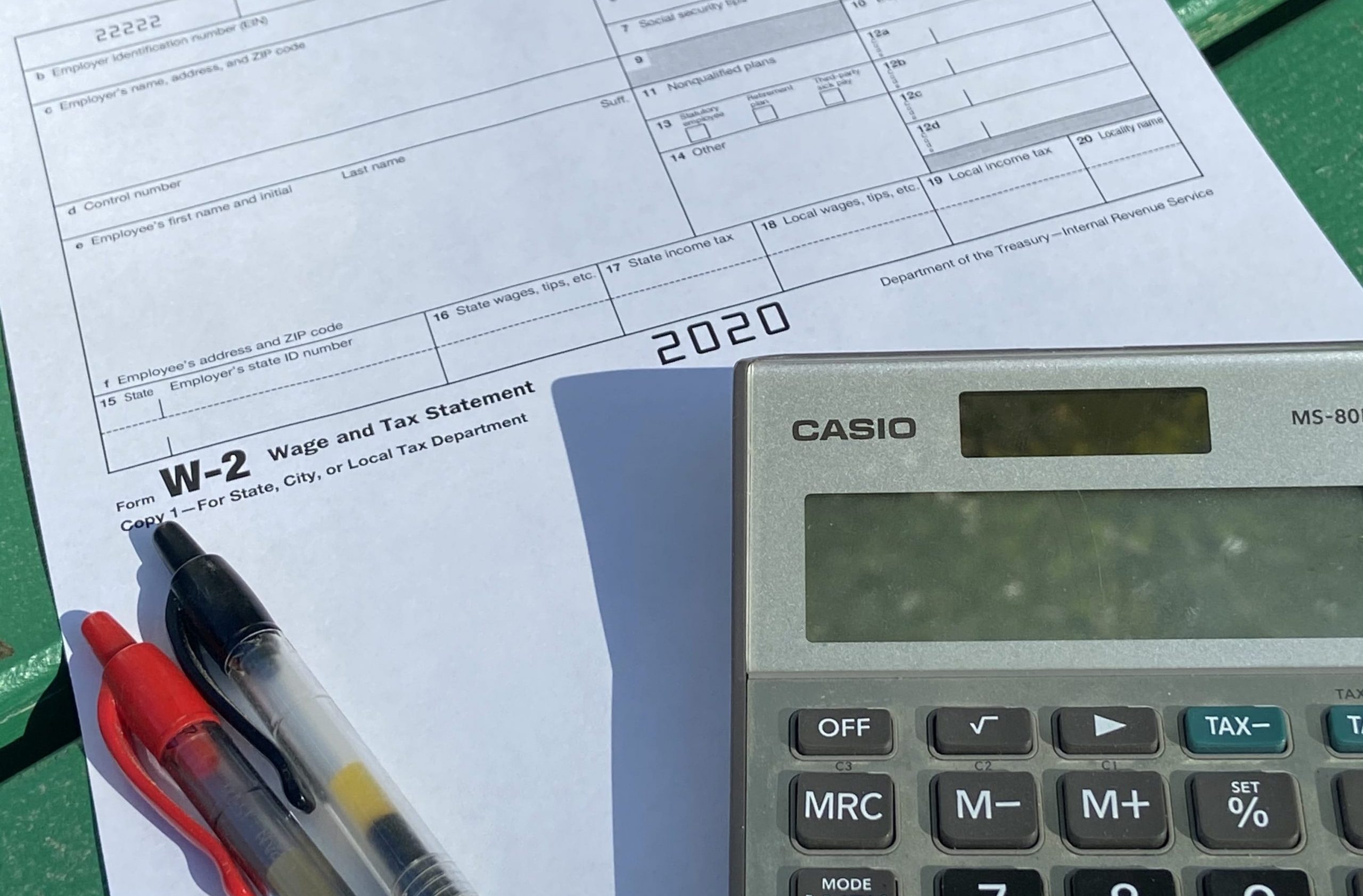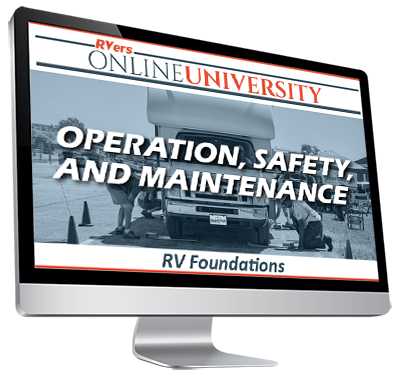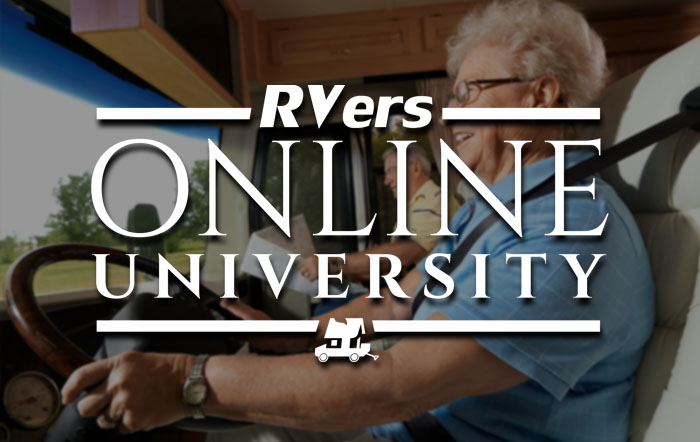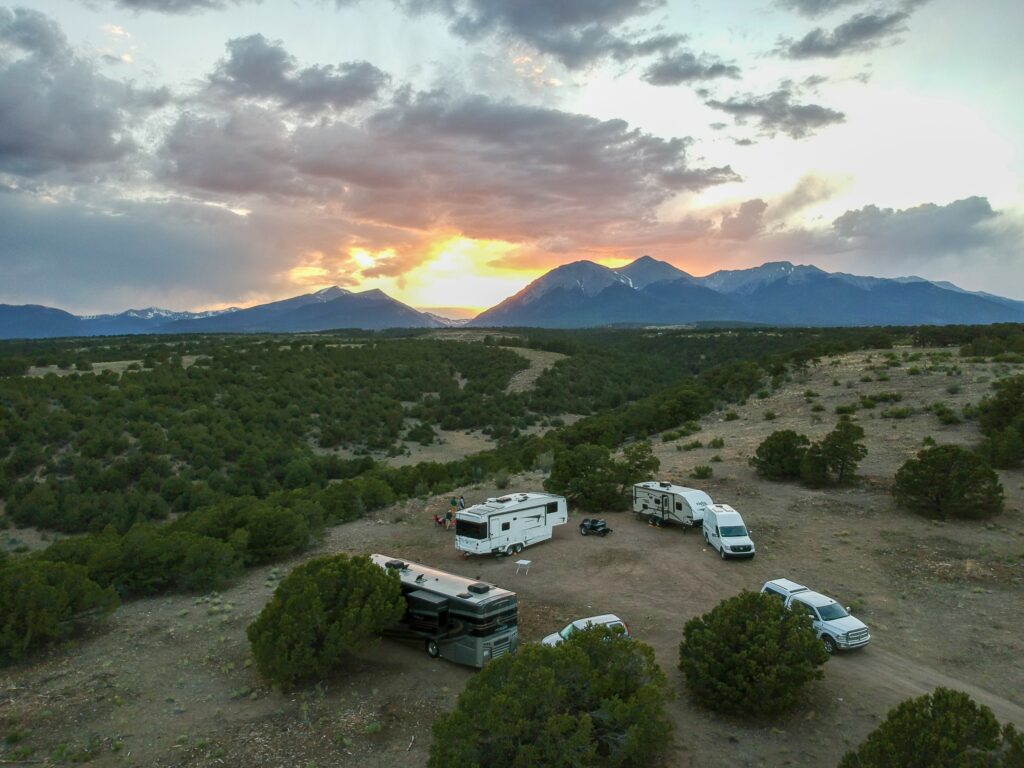
2020! Enough said, right?
It has been one memorable year for us all. But it was particularly a struggle for many who live full-time in their RVs. As I’m sure you’re already well aware that many RV parks, state parks, campgrounds and public lands across the country closed forcing many full-timers to scramble to find a place to park their home. While full-timers are used to unique stressors of RV life, this added to the stress for many.
The closures and quarantines along with government orders forced many to stay put for weeks or months at a time. This puts many RVers in a unique situation when it comes to taxes. Will you now owe income tax to the state in which you quarantined?
Let’s take a deeper dive into when you owe state income taxes.
Employed in a State
If you’re employed in a state, then you are most likely going to work every day as required by your employer. This could be anything from a traveling nurse to a traveling construction worker to a campground host. This means you are physically working in that state and more than likely staying there for weeks or months at a time.
You will owe state income taxes to that state for any income from the job completed in that state. This means if you work as a traveling nurse and earned 3 months of income in Idaho, then you owe the state of Idaho income tax on that 3 months of income.
Keep in mind, every state has a minimum income level earned before state taxes would be owed. This is where it can get complicated. However, if your employer withholds state taxes from your W-2, then you’ll definitely want to file in that state. If you don’t meet the minimum for paying income taxes in that state, you’ll receive any taxes paid as a refund. Yes, this adds a little extra work to your tax preparation, but it’s worth it to get any refund owed to you.
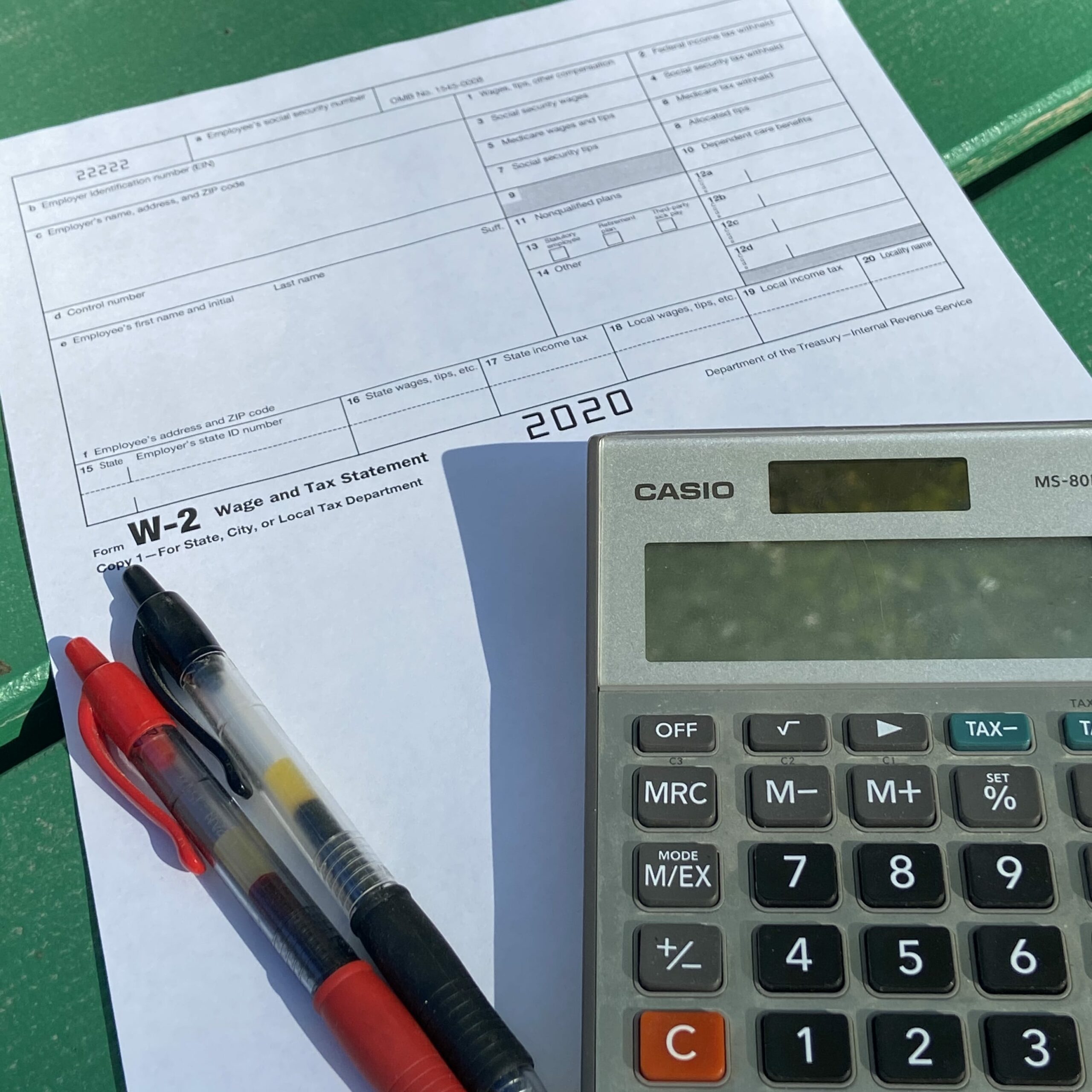
Let’s look at an example.
You spend the summer in Colorado working as a campground host. You are paid W-2 wages and Colorado income tax is withheld. Therefore, you’ll need to file a Colorado state income tax return as a nonresident.
Directly from the state of Colorado:
A nonresident is an individual who did not reside within the boundaries of Colorado at any time during the tax year. However, the person may have temporarily lived and/or worked in Colorado. A nonresident is required to file a Colorado income tax return if they:
- are required to file a federal income tax return, and
- had taxable Colorado-source income.
Nonresidents will initially determine their Colorado taxable income as though they are full-year residents. Nonresidents of Colorado will complete the Colorado Individual Income Tax Booklet DR 0104 and the Nonresident tax calculation schedule DR 0104PN to determine what income will be claimed on the Colorado 104 return.
You can see it gets complicated, and you need to understand the law for any state in which you physically worked and earned income was reported on a W-2.
But what about if you didn’t physically go to work in a state but got “stuck” there during quarantine?
Other Situations Where You May Owe State Income Tax
There are certain states that consider that you are working in that state the minute you cross the border, while others give allowances for transient workers. It’s important to know the rules for the various states to truly know whether or not you’ll owe a state tax return.
States that impose income tax on the first day nonresidents work in their state:
- Alabama
- Arkansas
- Colorado
- Delaware
- Indiana
- Iowa
- Kansas
- Kentucky
- Louisiana
- Maryland
- Massachusetts
- Michigan
- Mississippi
- Montana
- Nebraska
- New Jersey
- North Carolina
- Ohio
- Pennsylvania
- Rhode Island
- Vermont
- Virginia
This means you technically should be reporting any income earned while living in that state on a nonresident tax return.
Again, every state has a different threshold for owing taxes. You’ll have to do research to know the specific rules for the state or states you “lived in” during quarantine.
Each state has a unique threshold requirement for filing a state return. It can vary across the board and states calculate the threshold for state-earned gross income differently as well. For some it’s a straight dollar amount. For example, Arizona filing requirement is
- single AZ AGI at least $5,000 or gross income is greater than $15,000
- married filing jointly, AZ AGI is at least $11,000 or gross income is greater than $15,000
Let’s look at another example. Let’s stay in the desert southwest with New Mexico. Nonresidents are required to file if they are required to file a federal return and they receive ANY New Mexico-source income.
Just looking at the two examples above shows how varied the filing requirements are from state to state.
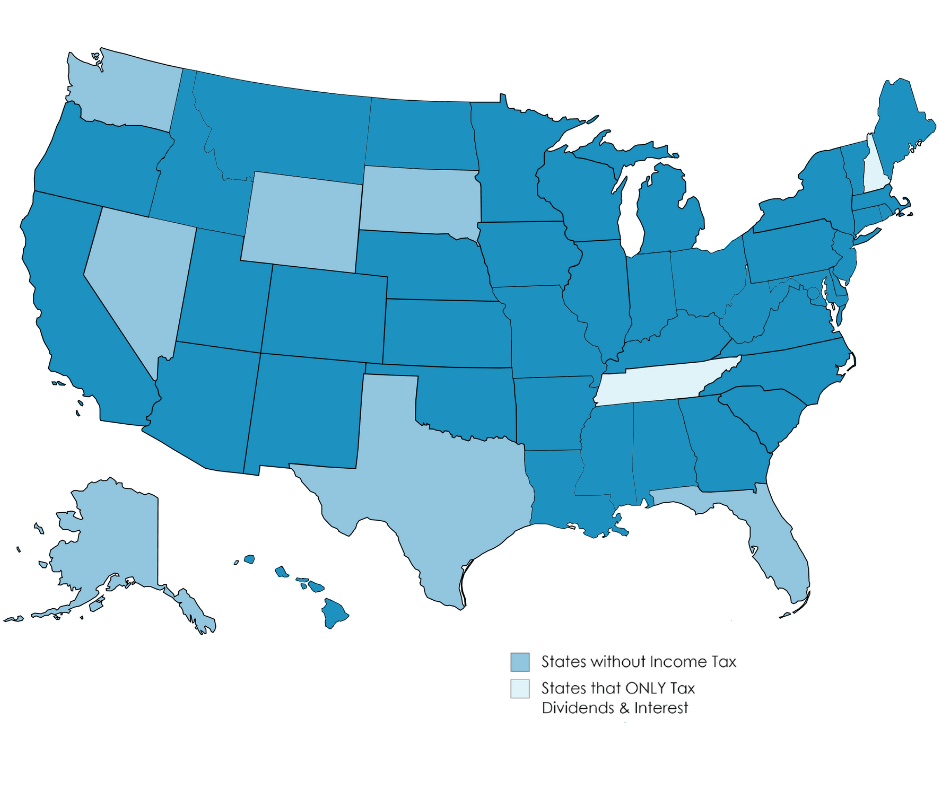
States that impose income tax on nonresidents after a state-specific threshold is reached (varies by state):
- Arizona
- California
- Connecticut
- Georgia
- Hawaii
- Idaho
- Illinois
- Maine
- Minnesota
- Missouri
- New Mexico
- New York
- North Dakota
- Oklahoma
- Oregon
- South Carolina
- Utah
- West Virginia
- Wisconsin
This means you technically should be reporting any income earned while living in that state on a nonresident or possibly a resident tax return.
Resident Tax Return
When will you be required to file a resident tax return? There are different rules for different states. Also, residency is different than domicile and many states see distinctions between the two. You can be a resident without a state being your domicile.
Let’s look at a few examples.
New York
To be a resident in NY you must spend 184 days or more in New York state during a tax year. You also must have an abode there (your RV in an RV park quarantined could possibly count).
Again, every state has a different threshold for owing taxes. You’ll have to do research to know the specific rules for the state or states you “lived in” during quarantine.
Residents are always required to file a return. However, part-year or nonresidents have the following requirements: NY AGI above $8,000 for single and $16,050 for married filing jointly.
Arizona
Individuals who spend more than nine months of the tax year within Arizona are presumed to be residents. If you didn’t spend more than nine months in Arizona, then you’d be considered a nonresident for tax purposes. Nonresidents are individuals whose permanent domicile is not Arizona.
To reiterate from the example above, the Arizona income threshold for needing to file a tax return is Arizona AGI at least $5,000 for single or $11,000 Married Filing Jointly or gross income at least $15,000 for any taxpayer.
Utah
According to Utah rules and regulations residents are individuals who are domiciled in Utah for any period of time during the taxable year, but only for the duration of that period.
Part-year residents are individuals who are residents for part of the year and nonresidents for part of the year. All income received during the period of residency is taxable in Utah, regardless of where that income is earned, unless specifically exempted. Income from Utah sources is taxable in Utah during the period of non-residency.
Utah residents are required to file a return if they are required to file a federal income tax return.
A nonresident is a person who is not a resident. Seems simple enough, right?
In addition, nonresident individuals are required to file if they have income from Utah sources and are required to file a federal income tax return.
As you can see from the examples above, each state treats taxes and residency differently.
No Income Tax States
I’m sure you’re all aware of this last one as many full-time RVers choose one of these states for their residency and domicile.
Hopefully, many of you got “stuck” or quarantined in one of these states. That sure would make tax time much simpler.
States that do not impose income tax:
- Alaska
- Florida
- Nevada
- New Hampshire
- South Dakota
- Tennessee
- Texas
- Washington
- Wyoming
Military Personnel
The only exception to these rules for most states would be military personnel. If you fit into that category, then you’ll most likely only be taxed by your resident state even if you lived in another. However, a military spouse could have earned income in a state if they physically go to work there.
Tracking Travel
Because of all the rules and regulations, I strongly urge all RV nomads whether you are part-time or full-time to keep a good travel log. This should include date, place, purpose of travel and how many days for that stay. As an added bonus, include mileage on your travel log, so you can tally up any business travel for a possible business tax deduction if you run a business from the road.
Here’s an example:

I encourage you to make a travel log that fits your style and keeps the data you need not just for taxes but also for budgeting. You can include costs of stay in there to determine nightly cost and to make sure you’re keeping within your budget for RV park/campground costs. Your travel log should truly reflect what information you need or want in addition to the night spent in a state.
Added bonus. If you keep a travel log during the year, it will make tax time much easier. Well, at least it will help determine how many days or months you truly spent in a state. From there you can research that state’s tax laws to understand if you are obligated to file a return there.
Business Income
If you run a business from the road, how do you determine how much was earned in one state vs. another?
This can be accomplished by having the above-mentioned travel log and comparing it to data from your accounting software. Most accounting software will allow you to run reports for a specific time period.
Let’s say you spent 5 months in Arizona during quarantine. You have two options.
- Run a report for that time period to determine income earned while in that state. Most states still allow you to deduct expenses to get your net profit for that time period.
- Divide your annual income by 12 to get your monthly income. If you earn $60,000 annually, then your monthly income would be $5,000. If you spend 5 months in Arizona, then multiply the monthly times 5 to get your Arizona earned income or $25,000. This works best for those who have steady income throughout the year. If you have more of a seasonal business or your income fluctuates throughout the year, this might not be beneficial.
This can truly make taxes difficult and more complicated. However, having a financial report for a specific time period will allow you to allocate earned income to each individual state much quicker. If you’re struggling with this, then I urge you to contact a tax professional to help you with your taxes for 2020. Most tax professionals can not only help taxpayers file in multiple states, but they also should know or have state filing requirements at their fingertips.
I personally have helped many full-time RVers file in multiple states for both personal and business returns. Since taxes can vary quite widely, I work with taxpayers on an individual basis to determine their filing needs. If you feel up to the task of researching the states where you spent time, then go for it. Search for the department of revenue or taxation and see what you can find to do it on your own. It can be done with a little research.
I will end here and suggest you talk with a tax expert about your individual situation because of the differences and complications described above.

Author
Heather Ryan – CPA | SKP# 140561
Heather is the owner of Tax Queen, a tax firm supporting entrepreneurs and digital nomads. As a federally licensed Enrolled Agent, she supports her clients year-round with tax preparation, tax planning, and bookkeeping for RV entrepreneurs. She also educates digital nomads and entrepreneurs through her blog posts and has written a book, Taxes for RV Owners, to help RV owners understand deductions and taxes. She hit the road in September 2016 and travels in a 5th wheel with her husband and two dogs.

